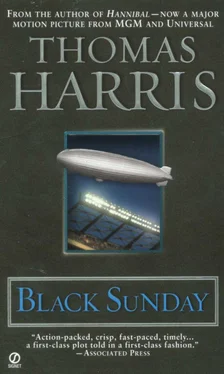The freighter was well astern now, but as they watched, the cutter appeared, still beyond the freighter but coming hard, throwing a big bow wave. As Lander looked back over his shoulder he saw the cutter’s bow swing slightly until it pointed dead at him.
Fasil scrambled up the ladder until his head was above the level of the flying bridge. “He’s ordering us to halt:”
“Fuck him. Switch to the Coast Guard frequency. It’s marked on the dial. We’ll see if he calls for help.”
With the running lights off, the boat raced toward the last glow in the west. Behind them, graceful white bow and bow wave gleaming in the last light, the Coast Guard cutter charged like a terrier.
Dahlia had finished clamping the passive radar reflector to the handrail on the bridge. It was a kite-shaped assembly of metal rods, which she had bought in a marine supply store for twelve dollars, and it trembled as the boat plunged through the seas.
Lander sent her below to check the lashings. He wanted nothing to come adrift in the pounding the boat would have to take.
She checked the cockpit first and then worked forward to the cabin where Fasil frowned at the radio.
“Nothing yet,” he said in Arabic. “Why the radar reflector?”
“The Coast Guard would have seen us anyway,” Dahlia said. She had to yell in his ear to be heard in the plunging boat. “When the Coast Guard captain sees that the chase will continue into darkness, he will have his radar operator get a fix on us and track us while he can still follow visually—then there will be no problem identifying the blip we make on his screen after the light is gone.” Lander had explained all this at tiresome length. “With that reflector, it is a big, fat blip, distinct from interference from the waves. Like the image of a metal boat.”
“Is—”
“Listen to me,” she said urgently, glancing upward toward the bridge above their heads. “You must not act familiar with me in any way, or touch me, do you understand? You must speak only English in his presence. Never come upstairs in his house. Never surprise him. For the sake of the mission.”
Fasil’s face was lit from beneath by the radio dials, his eyes glowing in their shadowed sockets. “For the mission, then, Comrade Dahlia. As long as he functions, I will humor him.”
Dahlia nodded. “If you don’t humor him, you may find out how well he functions,” she said, but the words were lost in the wind as she climbed aft.
It was dark now. There was only the faint light of the binnacle on the bridge, visible to Lander alone. He could see the red and green running lights of the cutter clearly and its big searchlight boring into the dark. He estimated that the government vessel had about a half-knot advantage and his lead was about four-and-a-half miles. Fasil climbed up beside him. “He’s radioed customs about the Leticia. He says he’s going to take us himself.”
“Tell Dahlia it’s almost time.”
They were pounding toward the sealanes now. Lander knew that the men in the cutter could not see him, yet the vessel matched every slight course alteration he made. He could almost feel the fingers of the radar on his back. It would be better if there were some ships… yes! Off the port bow were the white range lights of a ship, and as the minutes passed he raised her running lights. A freighter northbound and plowing along at a good rate. He altered course slightly to pass under her bows as closely as possible. Lander saw in his mind the patrol boat’s radar screen, its green light glowing on the face of the operator watching the big image of the freighter and the smaller one of the speedboat converge, the blips glowing bright each time the sweep went around.
“Get ready,” he yelled to Dahlia.
“Let’s go,” she said to Fasil. He did not ask questions. Together they pulled the little platform with the floats clear of the lashed-down explosives. Each float was made of a five-gallon drum and each had a pinhole in the top and an ordinary faucet in its underside. Dahlia brought the mast from the cabin and the radar reflector from the bridge. They clamped the reflector to the top of the mast and set the mast in a socket on the platform. With Fasil’s help she attached a six-foot line to the underside of the platform and secured the other end to a heavy lead weight. They looked up from their work to see the lights of the freighter hanging almost over them, its bow like a cliff. In a flash they were past it.
Lander, angling north, looked back over the stern to keep the freighter between him and the patrol boat. Now the radar blips had merged, the greater height of the freighter shielding Lander’s boat from the radar impulses.
He estimated the distance back to the cutter. “Half turn on the faucets.” A moment later, he cut the engines. “Overboard.”
Dahlia and Fasil dropped the floating platform over the side, the mast wagging wildly until the weight hanging down beneath the platform steadied it like a keel, holding the radar reflector high above the water. The device rocked again as Lander rammed the throttles home and headed straight south in the blacked-out boat.
“The radar operator can’t be sure if the image of the reflector is us or something new, or if we’re running along on the other side of the freighter,” Fasil said. “How long will it float?”
“Fifteen minutes with the faucets half open,” Dahlia said. “It will be gone when the cutter gets there.”
“Then he will follow the ship north to see if we’re alongside?”
“Perhaps.”
“How much can he see of us now?”
“A wooden boat at this range, not much if anything. Even the paint is not lead-based. There will be some wake interference from the ship. The engine noise from the ship will help too, if he stops to listen. We don’t know yet if he’s taken the bait.”
From the bridge, Lander watched the lights of the patrol boat. He could see the two high white range lights and the red portside running light. If she turned toward him, he would see the green starboard light come around.
Dahlia was beside him now and together they watched the cutter’s lights. They saw only red, and then as the distance increased they could make out only the white range lights, then nothing but an occasional beam of the searchlight, raised by a wave, probing the empty dark.
Lander was aware of a third presence on the bridge.
“A nice piece of work,” Muhammad Fasil said.
Lander did not answer him.
MAJOR KABAKOV’S EYES WERE REDand he was irritable. The clerks in the New York office of the Immigration and Naturalization Service had learned to walk softly around him as he sat, day after day, studying mug shots of Arab aliens living in the United States.
The ledger-sized books piled on either side of him at the long table contained, in all, 137,000 photos and descriptions. He was determined to look at every one. If the woman was on a mission in this country, she would have established a cover first, he was convinced of it. The “suspicious Arab” file maintained sub rosa by Immigration had contained few women, and none of them resembled the woman in Hafez Najeer’s bedroom. Immigration and Naturalization estimated there were some 85,000 Arabs on the Eastern Seaboard who had entered the country illegally over the years and appeared in nobody’s file. Most of them worked quietly at inconspicuous jobs, bothered no one and rarely came to the attention of the authorities. The possibility plagued him that the woman might be one of these.
Wearily, he turned another page. Here’s a woman. Kather ine Ghalib. Working with retarded children in Phoenix. Fifty years old and looks it.
A clerk was at his elbow. “Major, there’s a call for you in the office.”
Читать дальше












